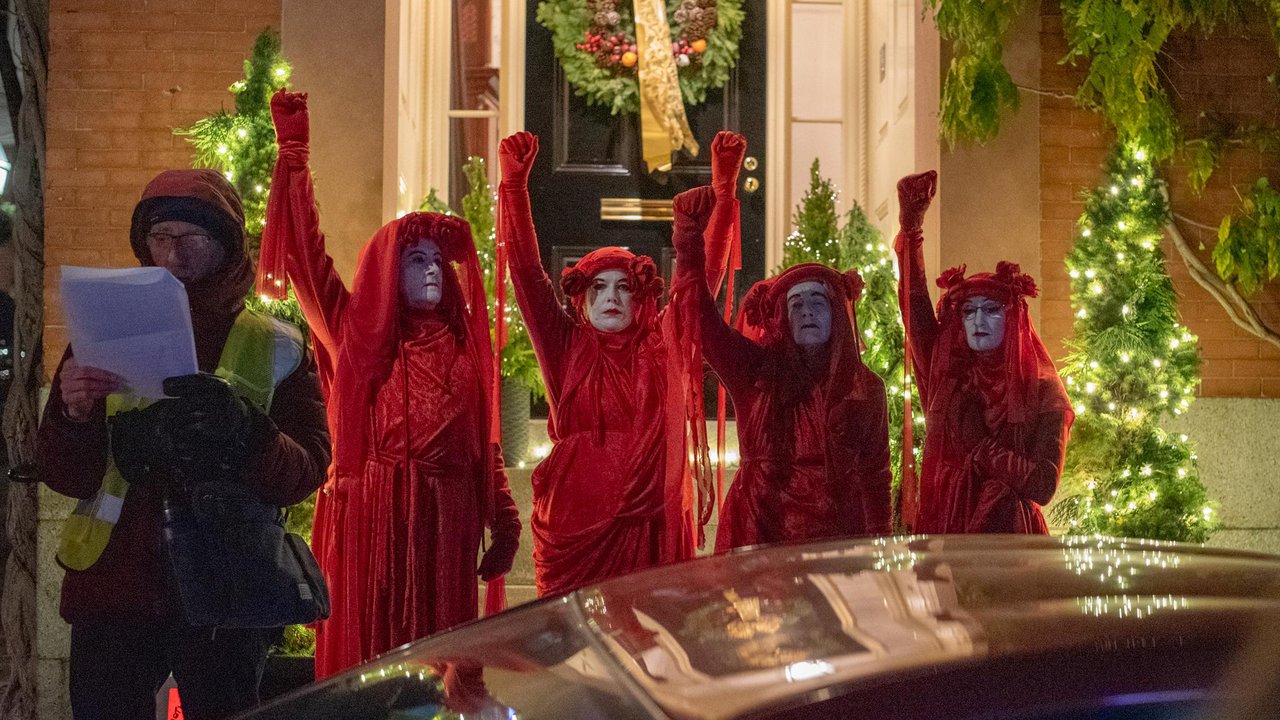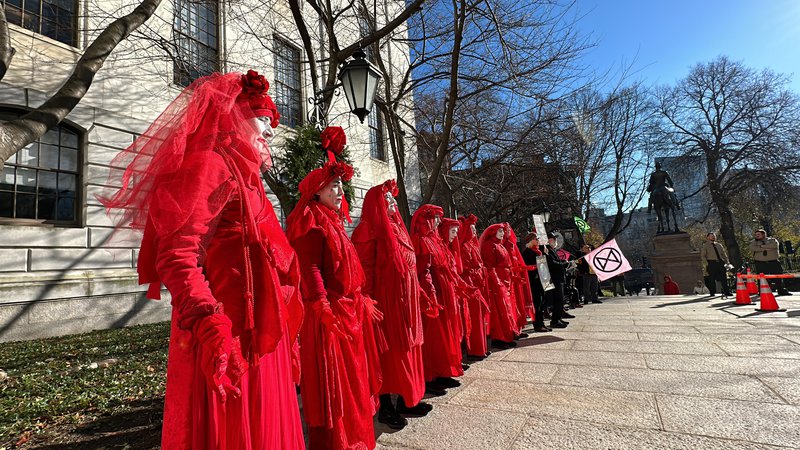
COP28: What Happened and What Happens Now?
COP28: Why does it matter?
The annual Emissions Gap report, which assesses countries' promises to tackle climate change compared with what is needed, revealed that the world faces between 2.5C (4.5F) and 2.9C (5.2F) of warming above pre-industrial levels if governments do not boost climate action immediately. At 3C of warming, scientists predict the world could pass several catastrophic points of no return, from the runaway melting of ice sheets to the Amazon rainforest drying out. COP is considered to be the best opportunity for globally mandated climate action through traditional channels.
What really happened at the conference?
If you’ve been following the 2023 United Nations Climate Change Conference AKA Conference of the Parties of the UNFCCC, more commonly known as COP28, you’ve probably read a lot of confusing rhetoric telling you that it was a success. Of course, success is subjective. XR Boston was skeptical of this year’s conference from the beginning, partly because it was hosted in Dubai, UAE. The UAE is one of the world's top 10 oil-producing nations. If that wasn't concerning enough, the U.N. appointed Sultan al-Jaber, chief executive of the state-owned oil company, as COP28 president. Nearly 100,000 politicians, diplomats, journalists and campaigners registered for the meeting, making it the biggest climate conference ever held. Participants included around 2,400 people connected to the coal, oil and gas industries, which underlined obvious concern about the influence of fossil fuel groups.
The conclusion, borrowed from the Guardian:
THE WINNERS
The oil and gas industry | The need to “transition away from fossil fuels” may have finally been recognized after three decades of climate talks, but there is no clear obligation or hard timetable to achieve this, and numerous loopholes in the form of “transition fuels,” and allusions to carbon capture technologies and carbon credits.
The United States and China | The world’s two biggest emitters will be breathing a sigh of relief after leaving Cop28 with few extra burdens to change despite growing global alarm about climate disruption. The US pledged only $20m in new finance for poor countries and remains the biggest oil producer. China can continue building coal-power plants.
Sultan Al Jaber | Despite fierce criticism, the conference’s president got a compromise deal over the line that was widely praised by other nations as the best that could be achieved. It will also not lose him his day job as CEO of the United Arab Emirates’ biggest oil company, Adnoc, which is planning to expand output in defiance of scientific advice that this will push the world’s climate into more dangerous heating beyond 1.5C.
Clean energy companies | Solar, wind, and other clean energy firms look to be in for a bonanza after 118 governments at Cop28 pledged to triple the world’s renewable energy capacity by 2030. This is intended to cut the share of fossil fuels in the world’s energy production, but until now renewables have added to oil, coal and gas, rather than replace them.
Lobbyists | Industry representatives were present in record numbers in Dubai – 2,456 delegates from the oil and gas sector, 475 from the carbon capture and storage (CCS) industry, more than 100 from agribusiness and many more from elsewhere. Many will leave Dubai happy. The final text made no mention of the role of beef companies in the climate crisis, supported CCS and a debate on regulating the carbon trading market was scuppered for now.
THE LOSERS
The climate | The Paris Agreement’s most ambitious goal of limiting global heating to 1.5C was left nominally alive by Cop28, but has been killed off by the lack of urgency and specifics in the agreement. Despite the hottest summer in 120,000 years, the oil, gas, coal and farming companies that are heating the planet can continue to expand production for the foreseeable future.
Small Island States | The Alliance of Small Island States, which represents those most vulnerable to sea level rise, said the agreement contained “a litany of loopholes” and represented only “incremental” change, which was not sufficient to keep heating below 1.5C.
Climate justice | Despite progress at Cop28 in setting up a “loss and damage” fund, developing nations, which are most affected by the climate crisis but least to blame, say richer, industrialized countries are not paying enough to help them adapt and transition away from fossil fuels.
Future generations and other species | The biggest victims of the climate crisis remain under-represented in decision-making processes. Despite the record heat of 2023, this is still likely to be one of the coolest years in the lives of many young people. The goal of zero global deforestation by 2030 was welcomed by conservation groups, but many ecosystems will continue to be eroded by rising temperatures.
Scientists | Climate experts welcomed the mention of fossil fuels but said the deal did not reflect the urgency and clarity reflected in the science. “The lukewarm agreement reached at Cop28 will cost every country, no matter how rich, no matter how poor. Everyone loses,” said Friederike Otto, at Imperial College London, and co-founder of the World Weather Attribution group. “With every vague verb, every empty promise in the final text, millions more people will enter the frontline of climate change and many will die.”
What was COP28’s final word on fossil fuels?
The Conference’s final agreement on fossil fuels included a sentence calling for "transitioning away from fossil fuels in energy systems, in a just, orderly and equitable manner." In response to this, Harjeet Singh, the head of global political strategy for Climate Action Network International, said “The absence of explicit ‘phase-out’ language in the draft is significant, as it is a more measurable and definitive term, sending a strong message globally about a total shift away from fossil fuels.” He further explained, “The current terminology – ‘transitioning away’ – is somewhat ambiguous and allows for varying interpretations. In a public statement, Singh said, “The resolution is marred by loopholes that offer the fossil fuel industry numerous escape routes, relying on unproven, unsafe technologies.”
After this weak “transitioning away” language was used in the final fossil fuel agreement, Samoa spoke on behalf of the Small Island Nations: “We have come to the conclusion that the course correction that is needed has not been secured."
How can activists respond to COP28’s language on fossil fuels?
Climate champion Bill McKibben is proposing that the language of “transitioning away” is “a tool for activists to use henceforth. The world’s nations have now publicly agreed that they need to transition off fossil fuels, and that sentence will hang over every discussion from now on—especially the discussions about any further expansion of the fossil fuel energy. There may be barriers to shutting down operations (what the text of the agreement obliquely refers to as 'national circumstances, pathways and approaches.') But surely, if the language means anything at all, it means no opening no more new oil fields, no more new pipeline. No more new LNG export terminals. In fact, that last point—LNG export terminals—will almost certainly be the first real test of whether this agreement means anything.”
What actions can we take now?
First, it's past time for each of us to acknowledge that the UN is not coming to save us. Governments are not coming to save us. Corporations are not coming to save us. The COP conferences are yearly opportunities for those groups to prove us wrong, but we cannot expect them to build lifeboats when their financial incentive lies in distracting passengers from the sinking ship. It is time to build our own lifeboats.
Now is the time for civil disobedience, and we will help you do it, or help you to support those who do. We encourage you to sign up for an upcoming Non-Violent Direct Action Training to learn the practice of safe protest. If you feel the weight of climate emotions, join us for XR Boston's monthly climate grief circles. If joining alone feels overwhelming, reach out to our Outreach team at Outreach@xrboston.org and ask about our new “buddy system.”
Related Stories:
Featured:
-
Stop the Fossil Fuel Industry, Now: List of events for Extinction Rebellion Boston's September week of rebellion
-
A compilation of books, movies, articles, and ways to take action to protect Black lives
-
Nadia Colburn, PhD and member of Extinction Rebellion Media team, discusses how to talk about the climate and ecological crisis with family and friends.
Upcoming Events:
-
Mon Apr 29th @ 9 a.m.
-
Tue Apr 30th @ 9 a.m.
-
Wed May 1st @ 9 a.m.
